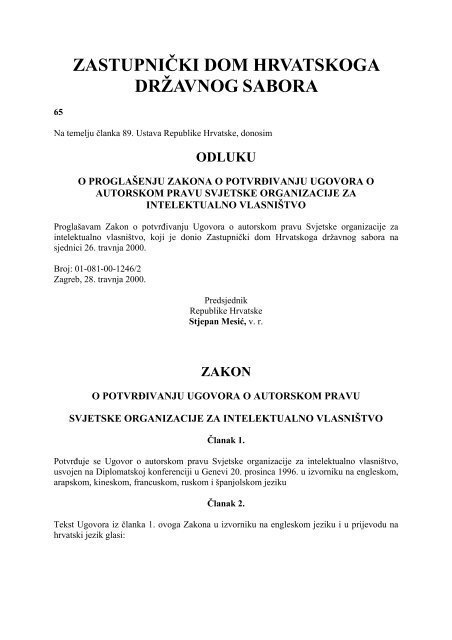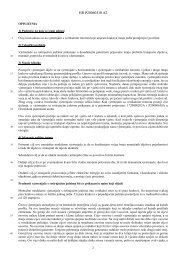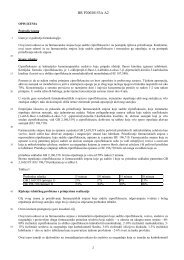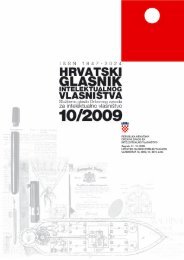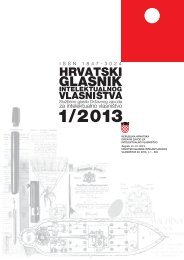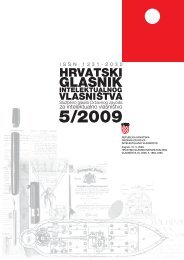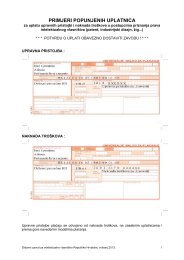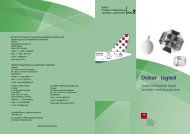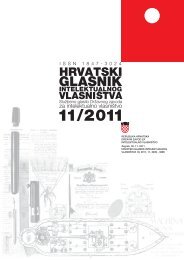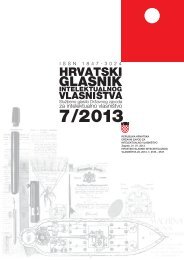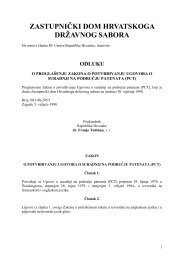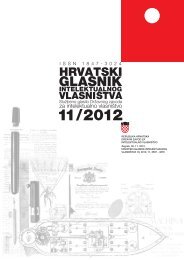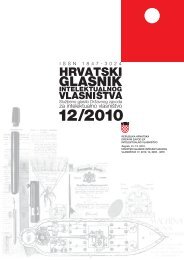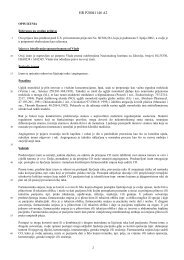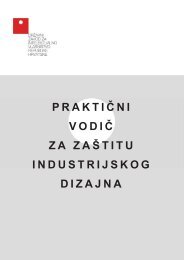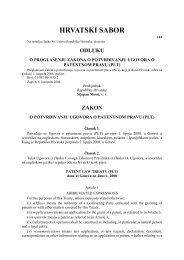Ugovor o autorskom pravu Svjetske organizacije za intelektualno ...
Ugovor o autorskom pravu Svjetske organizacije za intelektualno ...
Ugovor o autorskom pravu Svjetske organizacije za intelektualno ...
You also want an ePaper? Increase the reach of your titles
YUMPU automatically turns print PDFs into web optimized ePapers that Google loves.
ZASTUPNIČKI DOM HRVATSKOGA<br />
DRŽAVNOG SABORA<br />
65<br />
Na temelju članka 89. Ustava Republike Hrvatske, donosim<br />
ODLUKU<br />
O PROGLAŠENJU ZAKONA O POTVRĐIVANJU UGOVORA O<br />
AUTORSKOM PRAVU SVJETSKE ORGANIZACIJE ZA<br />
INTELEKTUALNO VLASNIŠTVO<br />
Proglašavam Zakon o potvrđivanju <strong>Ugovor</strong>a o <strong>autorskom</strong> <strong>pravu</strong> <strong>Svjetske</strong> <strong>organi<strong>za</strong>cije</strong> <strong>za</strong><br />
<strong>intelektualno</strong> vlasništvo, koji je donio Zastupnički dom Hrvatskoga državnog sabora na<br />
sjednici 26. travnja 2000.<br />
Broj: 01-081-00-1246/2<br />
Zagreb, 28. travnja 2000.<br />
Predsjednik<br />
Republike Hrvatske<br />
Stjepan Mesić, v. r.<br />
ZAKON<br />
O POTVRĐIVANJU UGOVORA O AUTORSKOM PRAVU<br />
SVJETSKE ORGANIZACIJE ZA INTELEKTUALNO VLASNIŠTVO<br />
Članak 1.<br />
Potvrđuje se <strong>Ugovor</strong> o <strong>autorskom</strong> <strong>pravu</strong> <strong>Svjetske</strong> <strong>organi<strong>za</strong>cije</strong> <strong>za</strong> <strong>intelektualno</strong> vlasništvo,<br />
usvojen na Diplomatskoj konferenciji u Genevi 20. prosinca 1996. u izvorniku na engleskom,<br />
arapskom, kineskom, francuskom, ruskom i španjolskom jeziku<br />
Članak 2.<br />
Tekst <strong>Ugovor</strong>a iz članka 1. ovoga Zakona u izvorniku na engleskom jeziku i u prijevodu na<br />
hrvatski jezik glasi:
UGOVOR O AUTORSKOM PRAVU SVJETSKE ORGANIZACIJE ZA<br />
INTELEKTUALNO VLASNIŠTVO<br />
<strong>Ugovor</strong>ne stranke,<br />
PREAMBULA<br />
Želeći razviti i održati <strong>za</strong>štitu prava autora na njihova književna i umjetnička djela na što je<br />
moguće, djelotvorniji i ujednačeniji način,<br />
Priznavajući potrebu uvođenja novih međunarodnih pravila i pojašnjenja tumačenja određenih<br />
postojećih pravila kako bi se dala odgovarajuća rješenja na pitanja koja proizlaze iz novih<br />
gospodarskih, društvenih, kulturnih i tehnoloških razvitaka,<br />
Priznavajući velik utjecaj razvitka i međusobnog zbližavanja informacijskih i<br />
komunikacijskih tehnologija na stvaranje i uporabu književnih i umjetničkih djela,<br />
Naglašavajući izvanredan značaj <strong>za</strong>štite autorskog prava <strong>za</strong> poticanje književnog i<br />
umjetničkog stvaralaštva,<br />
Priznavajući potrebu održavanja ravnoteže između prava autora i širega javnog interesa,<br />
posebice obrazovanja, istraživanja i pristupa informacijama, kao što se to odražava u Bernskoj<br />
konvenciji,<br />
Sporazumjele su se kako slijedi:<br />
Članak 1.<br />
ODNOS PREMA BERNSKOJ KONVENCIJI<br />
1. Ovaj <strong>Ugovor</strong> je poseban sporazum u smislu članka 20. Bernske konvencije <strong>za</strong> <strong>za</strong>štitu<br />
književnih i umjetničkih djela, što se tiče ugovornih stranaka koje su članice Unije utemeljene<br />
tom Konvencijom. Ovaj ugovor nema nikakve veze s drugim ugovorima, osim s Bernskom<br />
konvencijom, niti šteti bilo kojim pravima ili obve<strong>za</strong>ma iz bilo kojega drugog ugovora.<br />
2. Ništa u ovom <strong>Ugovor</strong>u ne ukida postojeće obveze što ih ugovorne stranke imaju jedna<br />
prema drugoj prema Bernskoj konvenciji <strong>za</strong> <strong>za</strong>štitu književnih i umjetničkih djela.<br />
3. U daljnjem se tekstu »Bernska konvencija« odnosi na Pariški akt Bernske konvencije <strong>za</strong><br />
<strong>za</strong>štitu književnih i umjetničkih djela od 24. lipnja 1971.<br />
4. <strong>Ugovor</strong>ne će se stranke pridržavati članaka od 1. do 21. i Dodatka Bernskoj konvenciji.<br />
Članak 2.<br />
OPSEG ZAŠTITE AUTORSKOG PRAVA<br />
Zaštita autorskog prava proteže se na izražaje a ne na ideje, postupke, metode rada ili<br />
matematičke koncepte kao takve.
Članak 3.<br />
PPRIMJENA ČLANAKA OD 2. do 6. BERNSKE KONVENCIJE<br />
<strong>Ugovor</strong>ne će stranke primjenjivati mutatis mutandis odredbe članaka od 2. do 6. Bernske<br />
konvencije u pogledu <strong>za</strong>štite predviđene ovim <strong>Ugovor</strong>om.<br />
Članak 4.<br />
RAČUNALNI PROGRAMI<br />
Računalni programi <strong>za</strong>štićeni su kao književna djela u smislu članka 2. Bernske konvencije.<br />
Ta se <strong>za</strong>štita primjenjuje na računalne programe, bez obzira na način ili oblik njihova izražaja.<br />
Članak 5.<br />
KOMPILACIJE PODATAKA (BAZE PODATAKA)<br />
Kompilacije podataka ili druge građe, u bilo kojem obliku, koje prema izboru ili rasporedu<br />
svoga sadržaja čine intelektualne tvorevine, <strong>za</strong>štićene su kao takve. Ta se <strong>za</strong>štita ne proteže na<br />
same podatke ili građu i ne šteti bilo kojem <strong>autorskom</strong> <strong>pravu</strong> koje postoji na podacima ili<br />
građi sadržanoj u toj kompilaciji.<br />
Članak 6.<br />
PRAVO STAVLJANJA U PROMET<br />
1. Autori književnih i umjetničkih djela uživaju isključivo pravo davanja dopuštenja <strong>za</strong><br />
stavljanje na raspolaganje javnosti izvornika i primjeraka njihovih djela prodajom ili drugim<br />
prijenosom vlasništva.<br />
2. Ništa u ovom <strong>Ugovor</strong>u ne utječe na slobodu ugovornih stranaka da odrede uvjete, ako ih<br />
ima, pod kojim se iscrpljuje pravo iz stavka 1. nakon prve prodaje izvornika ili primjerka<br />
djela ili drugog prijenosa vlasništva uz dopuštenje autora.<br />
1. Autori:<br />
i) računalnih programa,<br />
ii) kinematografskih djela, i<br />
Članak 7.<br />
PRAVO IZNAJMLJIVANJA<br />
iii) djela ugrađenih u fonograme, kako je određeno u nacionalnom <strong>za</strong>konu ugovornih<br />
stranaka,<br />
uživaju isključivo pravo davanja dopuštenja <strong>za</strong> komercijalno iznajmljivanje javnosti izvornika<br />
ili primjeraka svojih djela.
2. Stavak 1. ne primjenjuje se:<br />
i) u slučaju računalnih programa, kada sam program nije bitan predmet iznajmljivanja, i<br />
ii) u slučaju kinematografskih djela, osim ako je takvo komercijalno iznajmljivanje dovelo do<br />
rasprostranjenog umnožavanja tih djela što osjetno šteti isključivom <strong>pravu</strong> na umnožavanje.<br />
3. Bez obzira na odredbe stavka 1., ugovorna stranka koja je na dan 15. travnja 1994. godine<br />
imala i još uvijek ima na snazi sustav pravične naknade autorima <strong>za</strong> iznajmljivanje primjeraka<br />
njihovih djela ugrađenih u fonograme može održati taj sustav pod pretpostavkom da<br />
komercijalno iznajmljivanje djela ugrađenih u fonograme osjetno ne šteti isključivom <strong>pravu</strong><br />
autora na umnožavanje.<br />
Članak 8.<br />
PRAVO PRIOPĆAVANJA JAVNOSTI<br />
Bez štete <strong>za</strong> odredbe iz članka 11., stavka 1., točke ii), iz članka 11bis., stavka 1., točke i) i<br />
točke ii), iz članka 11ter., stavka 1., točke ii), iz članka 14., stavka 1. točke ii) i iz članka<br />
14bis., stavka 1. Bernske konvencije, autori književnih i umjetničkih djela uživaju isključivo<br />
pravo davanja dopuštenja <strong>za</strong> priopćavanje javnosti njihovih djela, putem žica ili bez žica,<br />
uključujući stavljanje na raspolaganje javnosti njihovih djela na način da svatko može<br />
pristupiti tim djelima s mjesta i u vrijeme koje pojedinačno odabere.<br />
Članak 9.<br />
TRAJANJE ZAŠTITE FOTOGRAFSKIH DJELA<br />
U pogledu fotografskih djela, ugovorne stranke neće primjenjivati odredbe članka 7., stavka<br />
4. Bernske konvencije<br />
Članak 10.<br />
OGRANIČENJA I IZUZECI<br />
1. <strong>Ugovor</strong>ne stranke mogu, u svojem nacionalnom <strong>za</strong>konodavstvu predvidjeti ograničenja ili<br />
izuzetke od prava priznatih autorima književnih i umjetničkih djela ovim <strong>Ugovor</strong>om u<br />
određenim posebnim slučajevima koji nisu u suprotnosti s redovitim iskorištavanjem djela i<br />
neopravdano ne štete legitimnim interesima autora.<br />
2. <strong>Ugovor</strong>ne će stranke prilikom primjene Bernske konvencije, svesti bilo kakva ograničenja<br />
ili izuzetke od prava što ih ona predviđa, na određene posebne slučajeve koji nisu u<br />
suprotnosti s redovitim iskorištavanjem djela i neopravdano ne štete legitimnim interesima<br />
autora.
Članak 11.<br />
OBVEZE U POGLEDU TEHNIČKIH MJERA<br />
<strong>Ugovor</strong>ne će stranke predvidjeti odgovarajuću pravnu <strong>za</strong>štitu i djelotvorna pravna sredstva<br />
protiv osujećenja djelotvornih tehničkih mjera što ih autori rabe u svezi s izvršavanjem<br />
njihovih prava prema ovom <strong>Ugovor</strong>u ili Bernskoj konvenciji, a koje ograničavaju djelovanja u<br />
pogledu njihovih djela, koja nisu dopuštena od strane dotičnog autora ili nisu dopuštena<br />
<strong>za</strong>konom.<br />
Članak 12.<br />
OBVEZE U POGLEDU INFORMACIJA<br />
O UPRAVLJANJU PRAVIMA<br />
1. <strong>Ugovor</strong>ne će stranke predvidjeti odgovarajuća i djelotvorna pravna sredstva protiv svake<br />
osobe koja svjesno izvodi bilo koju od sljedećih radnji znajući, ili bi u smislu<br />
građanskopravnih pravila imala osnova znati da će to uzrokovati, omogućiti, olakšati ili<br />
sakriti povredu bilo kojeg od prava obuhvaćenih ovim <strong>Ugovor</strong>om ili Bernskom konvencijom:<br />
i) uklanjanje ili preinačavanje bez dopuštenja bilo koje elektroničke informacije o upravljanju<br />
pravima,<br />
ii) stavljanje u promet, uvoz radi stavljanja u promet, emitiranje ili priopćavanje javnosti bez<br />
dopuštenja, djela ili primjeraka djela znajući da su elektroničke informacije o upravljanju<br />
pravima uklonjene ili preinačene bez dopuštenja.<br />
2. U smislu ovoga članka, »informacije o upravljanju pravima« znače informaciju koja<br />
identificira djelo, autora djela, nositelja bilo kojeg prava na djelo, ili informacije o rokovima i<br />
uvjetima <strong>za</strong> uporabu djela te bilo koje brojeve ili kodove koji predstavljaju takve informacije,<br />
kada se bilo koja od tih informacija prilaže uz primjerak djela ili se pojavljuje u svezi s<br />
priopćavanjem djela javnosti.<br />
Članak 13.<br />
VREMENSKA PRIMJENA<br />
<strong>Ugovor</strong>ne stranke će primjenjivati odredbe članka 18. Bernske konvencije na sve <strong>za</strong>štite<br />
predviđene ovim <strong>Ugovor</strong>om.<br />
Članak 14.<br />
ODREDBE O OSTVARIVANJU PRAVA<br />
1. <strong>Ugovor</strong>ne stranke se obvezuju da će usvojiti, u skladu sa svojim pravnim sustavima, mjere<br />
potrebne <strong>za</strong> osiguranje primjene ovog <strong>Ugovor</strong>a.<br />
2. <strong>Ugovor</strong>ne stranke će osigurati da su postupci <strong>za</strong> prisilno ostvarivanje prava dostupni prema<br />
njihovu <strong>pravu</strong> takvi da omogućuju učinkovito djelovanje protiv bilo kojeg čina povrede prava
obuhvaćenih ovim <strong>Ugovor</strong>om, uključujući br<strong>za</strong> pravna sredstva <strong>za</strong> sprečavanje povrede prava<br />
i mjere <strong>za</strong> odvraćanje od daljnje povrede prava.<br />
1. a) <strong>Ugovor</strong>ne stranke imaju Skupštinu.<br />
Članak 15.<br />
SKUPŠTINA<br />
b) Svaku ugovornu stranku <strong>za</strong>stupa jedan i<strong>za</strong>slanik kojemu mogu pomagati <strong>za</strong>mjenici,<br />
savjetnici i stručnjaci.<br />
c) Troškove svakog i<strong>za</strong>slanstva snosi ugovorna stranka koja je imenovala i<strong>za</strong>slanstvo.<br />
Skupština može <strong>za</strong>tražiti od <strong>Svjetske</strong> <strong>organi<strong>za</strong>cije</strong> <strong>za</strong> <strong>intelektualno</strong> vlasništvo (u daljnjem<br />
tekstu »WIPO«) da odobri financijsku pomoć, radi olakšanja sudjelovanja, i<strong>za</strong>slanstvima<br />
ugovornih stranaka koje se smatraju zemljama u razvoju ili u skladu s utvrđenom praksom<br />
Opće skupštine Ujedinjenih naroda.<br />
2. a) Skupština se bavi održanjem i razvojem ovog <strong>Ugovor</strong>a te njegovom primjenom i<br />
provedbom.<br />
b) Skupština obavlja funkciju koja joj je namijenjena prema članku 17., stavku 2. u pogledu<br />
dopuštenja da određene međuvladine <strong>organi<strong>za</strong>cije</strong> postanu strankama ovog <strong>Ugovor</strong>a.<br />
c) Skupština odlučuje o sazivanju svake diplomatske konferencije o reviziji ovog <strong>Ugovor</strong>a i<br />
daje potrebne upute glavnom direktoru WIPO-a <strong>za</strong> pripremu takve diplomatske konferencije.<br />
3. a) Svaka ugovorna stranka koja je država ima jedan glas i glasuje samo u svoje ime.<br />
b) Svaka ugovorna stranka koja je međuvladina organi<strong>za</strong>cija može sudjelovati u glasovanju,<br />
umjesto svojih država članica, s brojem glasova koji je jednak broju njezinih država članica<br />
koje su stranke ovog <strong>Ugovor</strong>a. Nijedna takva međuvladina organi<strong>za</strong>cija neće sudjelovati u<br />
glasovanju ako bilo koja od njezinih država članica izvrši svoje pravo na glasovanje i obrnuto.<br />
4. Skupština se sastaje na redovnim sjednicama jednom u dvije godine na poziv glavnog<br />
direktora WIPO-a.<br />
5. Skupština donosi svoj poslovnik, koji uključuje sazivanje izvanrednih sjednica, pravila o<br />
kvorumu i, nije li drukčije određeno ovim <strong>Ugovor</strong>om, potrebnu većinu glasova <strong>za</strong> različite<br />
vrste odluka.<br />
Članak 16.<br />
MEĐUNARODNI URED<br />
Međunarodni ured WIPO-a obavlja administrativne poslove koji se odnose na <strong>Ugovor</strong>.
Članak 17.<br />
SPOSOBNOST POSTATI STRANKOM UGOVORA<br />
1. Svaka država članica WIPO-a može postati strankom ovog <strong>Ugovor</strong>a.<br />
2. Skupština može svojom odlukom dopustiti svakoj međuvladinoj organi<strong>za</strong>ciji da postane<br />
strankom <strong>Ugovor</strong>a koja izjavi da je nadležna, i koja ima svoje propise koji obvezuju sve<br />
njezine države članice, što se tiče ovog <strong>Ugovor</strong>a, te je propisno ovlaštena, prema svojim<br />
unutarnjim pravilima postati strankom ovog <strong>Ugovor</strong>a.<br />
3. Europska <strong>za</strong>jednica, davanjem izjave navedene u prethodnom stavku na Diplomatskoj<br />
konferenciji koja je usvojila ovaj <strong>Ugovor</strong>, može postati strankom ovog <strong>Ugovor</strong>a.<br />
Članak 18.<br />
PRAVA I OBVEZE IZ OVOG UGOVORA<br />
Ako se to ne protivi bilo kojoj posebnoj odredbi iz ovog <strong>Ugovor</strong>a, svaka ugovorna stranka<br />
uživa sva prava i preuzima sve obveze iz ovog <strong>Ugovor</strong>a.<br />
Članak 19.<br />
POTPISIVANJE UGOVORA<br />
Ovaj je <strong>Ugovor</strong> otvoren <strong>za</strong> potpisivanje do 31. prosinca 1997. godine svim državama<br />
članicama WIPO-a i Europskoj <strong>za</strong>jednici.<br />
Članak 20.<br />
STUPANJE NA SNAGU UGOVORA<br />
Ovaj će <strong>Ugovor</strong> stupiti na snagu istekom tri mjeseca nakon što 30 država položi isprave o<br />
ratifikaciji ili pristupu kod glavnog direktora WIPO-a.<br />
Ovaj <strong>Ugovor</strong> obvezuje<br />
Članak 21.<br />
DATUM POSTAJANJA STRANKOM UGOVORA<br />
i) 30 država navedenih u članku 20. od datuma stupanja na snagu ovog <strong>Ugovor</strong>a;<br />
ii) svaku drugu državu, nakon isteka tri mjeseca od datuma na koji je ta država položila svoju<br />
is<strong>pravu</strong> kod glavnog direktora WIPO-a,<br />
iii) Europsku <strong>za</strong>jednicu, nakon isteka tri mjeseca od polaganja njezine isprave o ratifikaciji ili<br />
pristupu, ako se takva isprava položi nakon stupanja na snagu ovog <strong>Ugovor</strong>a prema članku<br />
20., ili nakon isteka tri mjeseca od stupanja na snagu ovog <strong>Ugovor</strong>a, ako se takva isprava<br />
položi prije stupanja na snagu ovog <strong>Ugovor</strong>a;
iv) bilo koju drugu međuvladinu organi<strong>za</strong>ciju kojoj je dopušteno postati strankom ovog<br />
<strong>Ugovor</strong>a, nakon isteka tri mjeseca od polaganja njezine isprave o pristupu.<br />
Članak 22.<br />
ISKLJUČENJE REZERVI NA UGOVOR<br />
Nikakva rezerva na ovaj <strong>Ugovor</strong> nije dopuštena.<br />
Članak 23.<br />
OTKAZIVANJE UGOVORA<br />
Ovaj <strong>Ugovor</strong> može otka<strong>za</strong>ti svaka ugovorna stranka putem notifikacije upućene glavnom<br />
direktoru WIPO-a. Svaki će otkaz imati učinak nakon isteka godine dana od datuma na koji je<br />
glavni direktor WIPO-a primio tu notifikaciju.<br />
Članak 24.<br />
JEZICI UGOVORA<br />
1. Ovaj <strong>Ugovor</strong> je potpisan u jednom izvorniku na engleskom, arapskom, kineskom,<br />
francuskom, ruskom i španjolskom jeziku, s tim da su verzije na svim ovim jezicima jednako<br />
vjerodostojne.<br />
2. Službeni tekst na bilo kojem jeziku osim onih navedenih u stavku 1. utvrđuje glavni<br />
direktor WIPO-a na <strong>za</strong>htjev <strong>za</strong>interesirane stranke, nakon savjetovanja sa svim<br />
<strong>za</strong>interesiranim strankama. Za potrebe ovog stavka, »<strong>za</strong>interesirana stranka« znači svaku<br />
državu članicu WIPO-a čiji je službeni jezik, ili čiji je jedan od službenih jezika u pitanju, i<br />
Europsku <strong>za</strong>jednicu, te svaku drugu međuvladinu organi<strong>za</strong>ciju koja može postati strankom<br />
ovog <strong>Ugovor</strong>a, ako je jedan od njezinih službenih jezika u pitanju.<br />
Članak 25.<br />
DEPOZITAR<br />
Glavni direktor WIPO-a depozitar je ovog <strong>Ugovor</strong>a.
WIPO COPYRIGHT TREATY<br />
PREAMBLE<br />
The Contracting Parties,<br />
Desiring to develop and maintain the protection of the rights of authors in their literary and<br />
artistic works in a manner as effective and uniform as possible,<br />
Recognizing the need to introduce new international rules and clarify the interpretation of<br />
certain existing rules in order to provide adequate solutions to the questions raised by new<br />
economic, social, cultural and technological developments,<br />
Recognizing the profound impact of the development and convergence of information and<br />
communication technologies on the creation and use of literary and artistic works,<br />
Emphasizing the outstanding significance of copyright protection as an incentive for literary<br />
and artistic creation,<br />
Recognizing the need to maintain a balance between the rights of authors and the larger public<br />
interest, particularly education, research and access to information, as reflected in the Berne<br />
Convention,<br />
Have agreed as follows:<br />
Article 1<br />
RELATION TO THE BERNE CONVENTION<br />
(1) This Treaty is a sprecial agreement within the meaning of Article 20 of the Berne<br />
Convention for the Protection of Literary and Artistic Works, as regards Contracting Parties<br />
that are countries of the Union established by that Convention. This Treaty shall not have any<br />
connection with treaties other than the Berne Convention, nor shall it prejudice any rights and<br />
obligations under any other treaties.<br />
(2) Nothing in this Treaty shall derogate from existing obligations that Contracting Parties<br />
have to each other under the Berne Convention for the Protection of Literary and Artistic<br />
Works.<br />
(3) Hereinafter, »Berne Convention« shall refer to the Paris Act of July 24, 1971, of the Berne<br />
Convention for the Protection of Literary and Artistic Works.<br />
(4) Contracting Parties shall comply with Articles 1 do 21 and the Appendix of the Berne<br />
Convention.
Article 2<br />
SCOPE OF COPYRIGHT PROTECTION<br />
Copyright protection extends to expressions and not to ideas, procedures, methods of<br />
operation or mathematical concepts as such.<br />
Article 3<br />
APPLICATION OF ARTICLES 2 TO 6 OF THE BERNE CONVENTION<br />
Contracting Parties shall apply mutatis mutandis the provisions of Articles 2 to 6 of the Berne<br />
Convention in respect of the protection provided for in this Treaty.<br />
Article 4<br />
COMPUTER PROGRAMS<br />
Computer programs are protected as literary works within the meaning of Article 2 of the<br />
Berne Convention. Such protection applies to computer programs, whatever may be the mode<br />
or form their expression.<br />
Article 5<br />
COMPILATIONS OF DATA (DATABASES)<br />
Compilations of data or other material, in any form, which by reason of the selection or<br />
arrangement of their contents constitute intellectual creations, are protected as such. This<br />
protection does not extend to the data or the material itself and is without prejudice to any<br />
copyright subsisting in the data or material contained in the compilation.<br />
Article 6<br />
RIGHT OF DISTRIBUTION<br />
(1) Authors of literary and artistic works shall enjoy the exclusive right of authorizing the<br />
making available to the public of the original and copies of their works through sale or other<br />
transfer of ownership.<br />
(2) Nothing in this Treaty shall affect the freedom of Contracting Parties to determine the<br />
conditions, if any, under which the exhaustion of the right in paragraph (1) applies after the<br />
first sale or other transfer of ownership of the original or a copy of the work with the<br />
autohori<strong>za</strong>tion of the author.
Article 7<br />
RIGHT OF RENTAL<br />
(1) Authors of<br />
(i) computer programs;<br />
(ii) cinematographic works; and<br />
(iii) works embodied in phonograms, as determined in the national law of Contracting Parties,<br />
shall enjoy the exclusive right of authorizing commercial rental to the public of the originals<br />
or copies of their works.<br />
(2) Paragraph (1) shall not apply<br />
(i) in the case of computer programs, where the program itself is not the essential object of the<br />
rental; and<br />
(ii) in the case of cinematographic works, unless such commerical rental has led to<br />
widespread copying of such works materially impairing the exclusive right of reproduction.<br />
(3) Notwithstanding the provisions of paragraph (1), a Contracting Party that, on April 15,<br />
1994, had and continues to have in force a system of equitable remuneration of authors for the<br />
rental of copies of their works embodied in phonograms may maintain that system provided<br />
that the commercial rental of works embodied in phonograms is not giving rise to the material<br />
impairment of the exclusive right of reproduction of authors.<br />
Article 8<br />
RIGHT OF COMMUNICATION TO THE PUBLIC<br />
Without prejudice to the provisions of Articles 11(1)(ii), 11bis(1)(i) and (ii), 11ter(1)(ii),<br />
14(1)(ii) and 14bis(1) of the Berne Convention, authors of literary and artistic works shall<br />
enjoy the exclusive right of authorizing any communication to the public of their works, by<br />
wire or wireless means, including the making available to the public of their works in such a<br />
way that members of the public may access these works from a place and at a time<br />
individually chosen by them.<br />
Article 9<br />
DURATION OF THE PROTECTION OF<br />
PHOTOGRAPHIC WORKS<br />
In respect of photographic works, the Contracting Parties shall not apply the provisions of<br />
Article 7(4) of the Berne Convention.
Article 10<br />
LIMITATIONS AND EXCEPTION<br />
(1) Contracting Parties may, in their national legislation, provide for limitations of or<br />
exceptions to the rights granted to authors of literary and artistic works under this Treaty in<br />
certain special cases that do not conflict with a normal exploitation of the work and do not<br />
unreasonably prejudice the legitimate interests of the author.<br />
(2) Contracting Parties shall, when applying the Berne Convention, confine any limitations of<br />
or exceptions to rights provided for therein to certain special cases that do not conflict with a<br />
normal exploitation of the work and do not unreasonably prejudice the legitimate interests of<br />
the author.<br />
Article 11<br />
OBLIGATIONS CONCERNING TECHNOLOGICAL MEASURES<br />
Contracting Parties shall provide adequate legal protection and effective legal remedies<br />
against the circumvention of effective technological measures that are used by authors in<br />
connection with the exercise of their rights under this Treaty or the Berne Convention and that<br />
restrict acts, in respect of their works, which are not authorized by the authors concerned or<br />
permitted by law.<br />
Article 12<br />
OBLIGATIONS CONCERNING RIGHTS<br />
MANAGEMENT INFORMATION<br />
(1) Contracting Parties shall provide adequate and effective legal remedies against any person<br />
knowingly performing any of the following acts knowing, or with respect to civil remedies<br />
having reasonable grounds to know, that it will induce, enable, facilitate or conceal an<br />
infringement of any right covered by this Treaty or the Berne Convention:<br />
(i) to remove or alter any electronic rights management information without authority;<br />
(ii) to distribute, import for distribution, broadcast or communicate to the public, without<br />
authority, works or copies of works knowing that electronic rights management information<br />
has been removed or altered without authority.<br />
(2) As used in this Article, »rights management information« means information which<br />
identifies the work, the author of the work, the owner of any right in the work, or information<br />
about the terms and conditions of use of the work, and any numbers or codes that represent<br />
such information, when any of these items of information is attached to a copy of a work or<br />
appears in connection with the communication of a work to the public.
Article 13<br />
APPLICATION IN TIME<br />
Contracting Parties shall apply the provisions of Article 18 of the Berne Convention to all<br />
protection for in this Treaty.<br />
Article 14<br />
PROVISIONS ON ENFORCEMENT OF RIGHTS<br />
(1) Contracting Parties undertake to adopt, in accordance with their legal systems, the<br />
measures necessary to ensure the application of this Treaty.<br />
(2) Contracting Parties shall ensure that enforcement procedures are available under their law<br />
so as to permit effective action against any act of infringement of rights covered by this<br />
Treaty, including expeditious remedies to prevent infringements and remedies which<br />
constitute a deterrent to further infringements.<br />
Article 15<br />
ASSEMBLY<br />
(1)(a) The Contracting Parties shall have an Assembly.<br />
(b) Each Contracting Party shall be represented by one delegate who may be assisted by<br />
alternate delegates, advisors and experts.<br />
(c) The expenses of each delegation shall be borne by the Contracting Party that has appointed<br />
the delegation. The Assembly may ask the World Intellectual Property Organi<strong>za</strong>tion<br />
(hereinafter referred to as »WIPO«) to grant financial assistance to facilitate the participation<br />
of delegations Contracting Parties that are regarded as developing countries in conformity<br />
with the established practice of the General Assembly of the United Nations or that are<br />
countries in transition to a market economy.<br />
(2)(a) The Assembly shall deal with matters concerning the maintenance and development of<br />
this Treaty and the application and operation of this Treaty.<br />
(b) The Assembly shall perform the function allocated to it under Article 17(2) in respect of<br />
the admission of certain intergovernmental organi<strong>za</strong>tions to become party to this Treaty.<br />
(c) The Assembly shall decide the convocation of any diplomatic conference for the revision<br />
of this Treaty and give the necessary instructions to the Director General of WIPO for the<br />
preparation of such diplomatic conference.<br />
(3)(a) Each Contracting Party that is a State shall have one vote and shall vote only in its own<br />
name.<br />
(b) Any Contracting Party that is an intergovernmental organi<strong>za</strong>tion may participate in the<br />
vote, in place of its Member States, with a number of votes equal to the number of its Member
States which are party to this Treaty. No such intergovernmental organi<strong>za</strong>tion shall participate<br />
in the vote if any one of its Member States exercises its right to vote and vice versa.<br />
(4) The Assembly shall meet in ordinary session once every two years upon convocation by<br />
the Director General of WIPO.<br />
(5) The Assembly shall establish its own rules of procedure, including the convocation of<br />
extraordinary sessions, the requirements of a quorum and, subject to the provisions of this<br />
Treaty, the required majority for various kinds of decisions.<br />
Article 16<br />
INTERNATIONAL BUREAU<br />
The International Bureau of WIPO shall perform the administrative tasks concerning the<br />
Treaty.<br />
Article 17<br />
ELIGIBILITY FOR BECOMING PARTY TO THE TREATY<br />
(1) Any Member State of WIPO may become party to this Treaty.<br />
(2) The Assembly may decide to admit any intergovernmental organi<strong>za</strong>tion to become party<br />
to this Treaty which declares that it is competent in respect of, and has its own legislation<br />
binding on all its Member States on, matters covered by this Treaty and that it has been duly<br />
authorized, in accordance with its internal procedures, to become party to this Treaty.<br />
(3) The European Community, having made the declaration referred to in the preceding<br />
paragraph in the Diplomatic Conference that has adopted this Treaty, may become party to<br />
this Treaty.<br />
Article 18<br />
RIGHTS AND OBLIGATIONS UNDER THE TREATY<br />
Subject to any specific provisions to the contrary in this Treaty, each Contracting Party shall<br />
enjoy all of the rights and assume all of the obligations under this Treaty.<br />
Article 19<br />
SIGNATURE OF THE TREATY<br />
This Treaty shall be open for signature until December 31, 1997, by any Member State of<br />
WIPO and by the European Community.
Article 20<br />
ENTRY INTO FORCE OF THE TREATY<br />
This Treaty shall enter into force tree months after 30 instruments of ratification or accession<br />
by States have been deposited with the Director General of WIPO.<br />
This Treaty shall bind:<br />
Article 21<br />
EFFECTIVE DATE OF BECOMING PARTY TO THE TREATY<br />
(i) the 30 States referred to in Article 20, from the date on which this Treaty has entered into<br />
force;<br />
(ii) each other State from the expiration of three months from the date on which the State has<br />
deposited its instrument with the Director General of WIPO;<br />
(iii) the European Community, from the expiration of three months after the deposit of its<br />
instrument of ratification or accession if such instrument has been deposited after the entry<br />
into force of this Treaty according to Article 20, or, three months after the entry into force of<br />
this Treaty if such instruments has been deposited before the entry into force of this Treaty;<br />
(iv) any other intergovernmental organi<strong>za</strong>tion that is admitted to become party to this Treaty,<br />
from the expiration of three months after the deposit of its instrument of accession.<br />
No reservation to this Treaty shall be admitted.<br />
Article 22<br />
NO RESERVATIONS TO THE TREATY<br />
Article 23<br />
DENUNCIATION OF THE TREATY<br />
This Treaty may be denounced by any Contracting Party by notification addressed to the<br />
Director General of WIPO. Any denunciation shall take effect one year from the date on<br />
which the Director General of WIPO received the notification.<br />
Article 24<br />
LANGUAGES OF THE TREATY<br />
(1) This Treaty is signed in a single original in English, Arabic, Chinese, French, Russian and<br />
Spanish languages, the versions in all these languages being equally authentic.<br />
(2) An official text in any language other than those referred to in paragraph (1) shall be<br />
established by the Director General of WIPO on the request of an interested party, after
consultation with all the interested parties. For the purposes of this paragraph, »interested<br />
party« means any Member State of WIPO whose official language, or one of whose official<br />
languages, is involved and the European Community, and any other intergovernmental<br />
organi<strong>za</strong>tion that may become party to this Treaty, if one of its official languages is involved.<br />
Article 25<br />
DEPOSITARY<br />
The Director General of WIPO is the depositary of this Treaty.<br />
Članak 3.<br />
Za provedbu ovoga Zakona nadležan je Državni <strong>za</strong>vod <strong>za</strong> <strong>intelektualno</strong> vlasništvo.<br />
Članak 4.<br />
Na dan stupanja na snagu ovoga Zakona <strong>Ugovor</strong> iz članka 1. ovoga Zakona <strong>za</strong> Republiku<br />
Hrvatsku nije na snazi, te će se podaci o njegovu stupanju na snagu objaviti sukladno odredbi<br />
članka 30. stavka 3. Zakona o sklapanju i izvršavanju međunarodnih ugovora.<br />
Članak 5.<br />
Ovaj Zakon stupa na snagu danom objave u »Narodnim novinama«.<br />
Klasa: 910-04/00-01/02<br />
Zagreb, 26. travnja 2000.<br />
ZASTUPNIČKI DOM HRVATSKOGA DRŽAVNOG SABORA<br />
Predsjednik<br />
Zastupničkog doma<br />
Hrvatskoga državnog sabora<br />
Zlatko Tomčić, dipl. ing., v. r.


